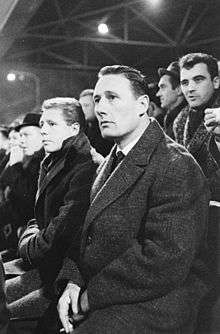Bram Appel
 Appel in 1963 | |||
| Personal information | |||
|---|---|---|---|
| Full name | Abraham Leonardus Appel | ||
| Date of birth | 30 November 1921 | ||
| Place of birth | Rotterdam, Netherlands | ||
| Date of death | 31 October 1997 (aged 75) | ||
| Place of death | Geleen, Netherlands | ||
| Playing position | Striker | ||
| Youth career | |||
| Blauw Zwart | |||
| SVT | |||
| 1940-1942 | Archipel | ||
| Senior career* | |||
| Years | Team | Apps | (Gls) |
| 1942-1944 | Hertha BSC | ||
| 1945-1947 | ADO Den Haag | ||
| 1948-1949 | Sittard | ||
| 1949–1954 | Stade de Reims | 154 | (96) |
| 1954–1955 | Lausanne Sports | 22 | (15) |
| 1955–1960 | Fortuna '54 | 109 | (57) |
| National team | |||
| 1948–1957 | Netherlands | 12 | (10) |
| Teams managed | |||
| 1954–1955 | FC Lausanne-Sport | ||
| 1955–1960 | Fortuna '54 | ||
| 1960–1962 | FC Volendam | ||
| 1962–1967 | PSV Eindhoven | ||
| 1967–1968 | Fortuna '54 | ||
| 1968–1970 | Beringen | ||
|
* Senior club appearances and goals counted for the domestic league only. | |||
Abraham ("Bram") Leonardus Appel (Rotterdam, 30 November 1921 – Geleen, 31 October 1997) was a Dutch football player.
Playing career
Club
Born in Rotterdam but raised in The Hague,[1] Appel played for local clubs Archipel and Blauw Zwart in the Dutch amateur leagues in the 1930s. He was forced to work in a factory in Berlin, Germany in 1942. The factory where he worked was bombed a year later, and Appel narrowly survived.
During the war, Appel played for Hertha BSC and for an unofficial Dutch national team, made up of Dutch forced labourers.[2] His refusal to give the Hitler salute before matches made the German authorities furious.
The Royal Dutch Football Association suspended Appel after the liberation in 1945.[1] He was, however, a member of the Netherlands national football team at the 1948 Summer Olympics.[3] He left for France in 1949, and became an important player for Stade Reims where he played alongside Raymond Kopa and Roger Marche. He won the Coupe de France in 1950 and the French national title in 1953. Appel scored 96 goals in 154 matches for Stade Reims.
Appel and Theo Timmermans took the initiative for a charity match for the victims of the North Sea flood of 1953, between France and Dutch footballers playing abroad.[4] The Dutch players won the match 2-1. The match was not an official international, because the Dutch players had been suspended from the Dutch national team. The Royal Dutch Football Association did not allow football players to be professionals. This match, however, paved the way for the acceptance of professional football in the Netherlands. Two years later, the ban on professionalism was lifted
Appel returned to the Netherlands in 1954, having been signed by Fortuna '54 as one of the first professional football players in the Dutch league.[5]
International
Appel made his official debut for the Netherlands in a July 1948 Olympic Games match against Great Britain in which he immediately scored 2 goals.[6] He earned a total of 12 caps, scoring 10 goals.
His final international was an April 1957 friendly match against West Germany.[7]
Managerial career
He became a manager in 1960,[8] and won the 1962/63 Eredivisie title as manager of PSV Eindhoven.
Personal life
He left the world of football after the title, and became a real estate agent. He lived a reclusive life at the end, and he died on 31 October 1997, one-month before his 76th birthday.
Honours
- KNVB Cup: 1
- 1957
- Ligue 1: 1
References
- 1 2 Bram Appel 1921 - 1997 - Trouw (Dutch)
- ↑ Bram Appel: wonderspits van Hertha in oorlogstijd - Friesch Dagblad (Dutch)
- ↑ "Bram Appel – Goals in International Matches". RSSSF.com.
- ↑ BRAM APPEL (1921-1997); Kanonnier - NRC (Dutch)
- ↑ Voetbal Limburg vecht tegen de ondergang - NRC (Dutch)
- ↑ Bram Appel – FIFA competition record
- ↑ International career stats - Voetbalstats
- ↑ "Voetbal International - Bram Appel". Vitotoleague.vi.nl. 30 November 1921.
External links
- Bram Appel at National-Football-Teams.com